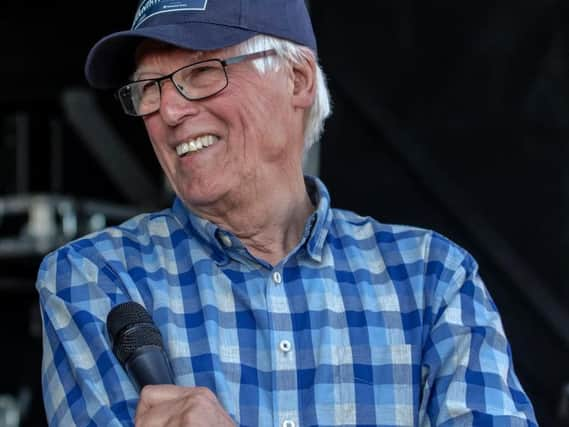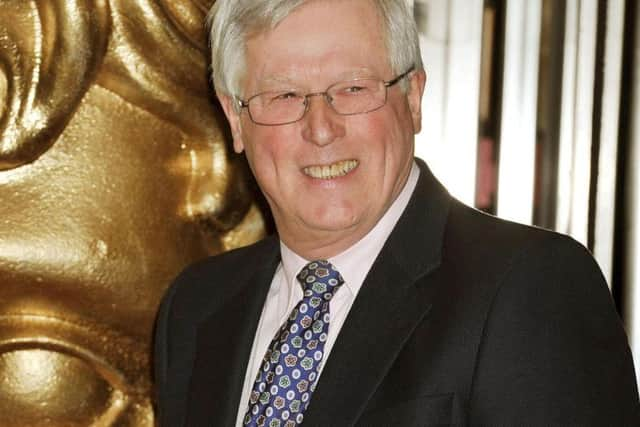John Craven on growing up in Leeds, his love of Yorkshire and working on Newsround and Countryfile


We meet in Lower Slaughter, the pretty Cotswolds village familiar to John because it’s where he filmed Countryfile Diaries recently. It’s a far cry from Grimthorpe Street in Leeds where he was born in 1940. He hasn’t lived in Yorkshire since his early 20s but he visits often – his sister Jean lives near Harrogate – and his love for his home county is palpable. “Still one of my favourite places in the world is Wharfedale and Otley Chevin, where I used to cycle with my mates. I love the coast too, especially Whitby, though we had family holidays in Bridlington because I suspect it was a bit cheaper.”
What was it like growing up at the end of the war in Headingley? “There’s no doubt that Grimthorpe Street was working class but it never felt deprived, I didn’t feel as though we were poor; I look back with great fondness on my childhood. I had a morning paper round from Stirk’s newsagent on Ash road, and another source of pocket money came from Headingley Cricket Ground, where I’d collect cushions and get pennies back from the ticket office. Empty beer and pop bottles went back to the office and soon I’d saved enough to buy a portable record player, a Philips DiscJockey – the ultimate in cool!”
Advertisement
Hide AdAdvertisement
Hide AdJohn was part of the 1950s first-teenagers vanguard and was quite the dandy, sporting a Tony Curtis DA and buying four-button-fronted Italian-style suits from Fifty Shilling Tailors in Leeds. “I was in the early stages of becoming a Mod, and we’d hang out at the Lounge Cinema, Bretts on North Lane where a bag of chips and scraps was threepence, and buy a packet of five Woodbines and cough our way through them.”


He went to Leeds Modern at the same time as Alan Bennett – “he was in the sixth form when I was a new boy but our paths didn’t really cross, but I remember his father’s butcher’s shop in Far Headingley, just around the corner from my grandma’s cottage, and I often went shopping for her there.” John left school at 16 for a commercial apprenticeship at Yorkshire Copperworks in Stourton, and though it wasn’t a great fit he started writing for the company magazine and interviewed the likes of Benny Hill and Cliff Richard who were appearing in Leeds, and his passion was fired.
His first proper job as a journalist was at the Harrogate Advertiser where he was a cub reporter, but he’d been ‘practising’ from an early age. At Headingley County Primary School on Bennett Road he earned his first fee (ten shillings) as a writer aged nine, winning a national essay competition run by Hovis. “Thanks to our headmaster, Mr Pepper who entered me and some classmates, I made a discovery that would shape the rest of my life – that you can actually make money from writing down words.”
Around the same time he founded the Grimthorpe Street Gazette – “a very local, very occasional newspaper, which was actually two sheets of lined paper from a jotting pad, handwritten by me and with a couple of drawings by my cousin Christine who lived two doors down”.
Advertisement
Hide AdAdvertisement
Hide AdA move to The Yorkshire Post followed his stint at the Harrogate Advertiser and he worked with the likes of Jean Rook, who was women’s editor, Bernard Ingham and the “fearsome” deputy editor and theatre critic Desmond Pratt. “I was living at the Burlington Hotel opposite the office, and in return for my board I worked the night shift on reception and the morning shift serving breakfasts. One morning Pratt, who was a regular guest, spotted me. ‘What the hell are you doing here, Craven?’ he bellowed. ‘Get back to your typewriter!’ I slunk off and fortunately he took it no further.”
But his star was on the rise and he jumped at the chance of television presenting, firstly at BBC Newcastle, and in 1970 he got the gig on the local news programme Points West in Bristol. Then he hit our TV screens in his psychedelic shirts presenting a children’s talk show called Search. Two years later, beginning with a six-week trial run, Newsround was born and he was to front it for 17 years. “I wasn’t the first choice,” says John. “It had been offered to Jonathan Dimbleby, but he’d just accepted a job on This Week at ITV. He’s recently said that the only programme he wished he’d been offered is Countryfile. I think things turned out pretty well for him, and it was a lucky break for me.”
In 1989, after 3,000 episodes, just days after announcing his departure from Newsround, he made the move away from children’s TV and began to present Countryfile. “It was like a second career. I was getting a bit old for Newsround and I thought ‘what am I going to do?’ Fortunately I was in the right place at the right time, it was a gift. One of the original reporters, Michael Colley, had left to do other programmes, and his agent said to him, you can always go back, John Craven isn’t going to be there forever. Well, 30 years and over 1,000 episodes later, I’m still here!”
John was awarded an OBE in 2000 for services to rural and children’s broadcasting. “I’m still surprised when people recognise me. I’m not show-bizzy at all, I’m not drawn to the red carpet. I love the journalistic side of things, the research, the scriptwriting, the interview. I’m pragmatic rather than precious.”
Advertisement
Hide AdAdvertisement
Hide AdAsked what he thinks defines the Yorkshire character, he could be describing himself: “Straightforward, warm, honest. Some people think they’re blunt and unemotional, but that’s not true. Blunt sometimes, perhaps, but kind and loving. My parents reaction to my first appearance on television was delivered with typical understatement: ‘You were quite good’ – the ultimate Yorkshire accolade. I think my background has served me well.
“I’m very proud of my heritage. Years ago I was awarded Yorkshireman of the Year in Barnsley, and my acceptance speech began, ‘I’m very pleased to receive this because I know in Yorkshire we always think twice about giving anyone anything’. My family will tell you that I’m ‘careful’ with money – one of my regular phrases is ‘Ow much?’ You can take the boy out of Yorkshire, but you can’t take Yorkshire out of the boy.”
He’s interviewed acting and actual royalty on Countryfile and everyone in-between. But when asked who his favourite interviewee has been, his response is immediate: “Ordinary people who work in the countryside, play in it and want to talk about it – though I really enjoyed my little Shakespeare duet with Dame Judi, we were the oldest Romeo and Juliet in the business.”
He’s travelled the globe several times over, but I wonder where his heart is? There’s a long, contemplative pause. “I’d like to come home,” he smiles, “and have my ashes scattered in Yorkshire, maybe on the top of Otley Chevin.” But there’s a way to go yet, he has no intention of quitting any day soon. “Like a trusty old workhorse, I’d have to be retired rather than choose to. Far too many people go a bit rusty when they give up the day job,” he laughs.
John Craven’s autobiography, Headlines and Hedgerows, published by Penguin Random House, is out now.